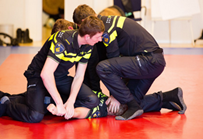Description project
 In this project, we aim to accelerate research on effective intra-team collaboration of police-teams by using and integrating multiple innovative measurement technologies. Police-teams have to respond effectively in stressful conditions such as crisis situations involving aggression and violence. Such situations require effective collaboration between all team members. However, research that specifically examines effective intra-team collaboration in police-teams is limited. Furthermore, current research that investigates team collaborative processes takes a reductionist approach by focusing on either the behavioral, cognitive, or emotional processes in isolation; while collaboration is defined as a multi-faced, dynamic, complex, social process. Research on effective collaboration in police-teams thus demands a holistic approach and ecologically valid experimental settings. Current progress in technology can propel large-scale, holistic, ecologically valid research in three ways; a) by using technologically advanced measurements (e.g., eye-tracking, biosensors), b) by automatization of measurement methods that have proven to be effective in studying collaboration, improving accuracy and time-efficiency (e.g., behavioral coding, pattern detection of temporal and positional data from movement tracking and observational analysis), and c) through the development of methods and tools for integrated, dynamic, spatiotemporal analysis of the data obtained with a and b, to interpret this data in a meaningful, efficient and standardized way and advance our understanding of collaboration processes.
In this project, we aim to accelerate research on effective intra-team collaboration of police-teams by using and integrating multiple innovative measurement technologies. Police-teams have to respond effectively in stressful conditions such as crisis situations involving aggression and violence. Such situations require effective collaboration between all team members. However, research that specifically examines effective intra-team collaboration in police-teams is limited. Furthermore, current research that investigates team collaborative processes takes a reductionist approach by focusing on either the behavioral, cognitive, or emotional processes in isolation; while collaboration is defined as a multi-faced, dynamic, complex, social process. Research on effective collaboration in police-teams thus demands a holistic approach and ecologically valid experimental settings. Current progress in technology can propel large-scale, holistic, ecologically valid research in three ways; a) by using technologically advanced measurements (e.g., eye-tracking, biosensors), b) by automatization of measurement methods that have proven to be effective in studying collaboration, improving accuracy and time-efficiency (e.g., behavioral coding, pattern detection of temporal and positional data from movement tracking and observational analysis), and c) through the development of methods and tools for integrated, dynamic, spatiotemporal analysis of the data obtained with a and b, to interpret this data in a meaningful, efficient and standardized way and advance our understanding of collaboration processes.
Expected outcomes
- A conceptual paper about the use of multi-channel data to more validly and holistically capture collaborative process in action teams including the results of a pilot study conducted in cooperation with the police-force (department operational support and training, OBT) and police-academy.
- Guidelines for designing effective scenario’s to train police teams how to respond to stressful situations
involved researchers
Dr. Marcella Hoogeboom - Contact person
Dr. Vana Hutter (VU Amsterdam)
Dr. Lucia Rabago Mayer
Dr. André Bester
Project Advice Committee from several departments from the UT and VU (department Educational Sciences; department Instruction Technology; department Human Movement Sciences; department Criminal Law and Criminology department; department Organizational Sciences; department Data Management & Biometrics; and department Formal Methods & Tools)
Duration of the project
September 2023 – July 2024
Funding & partners
VU-UT seedfunding project
publications and presentations related to this project
Not applicable
